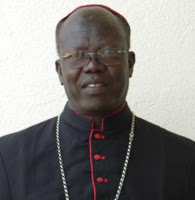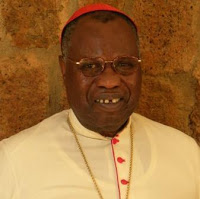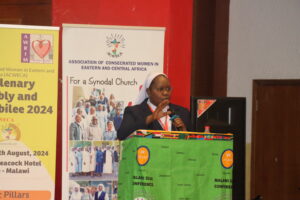SUDAN: Archbishop Didi Talks about Unfinished Business in El Obeid and Fitting into Cardinal Wako’s Shoes

Coadjutor
Archbishop elect of Khartoum, Most Reverend Michael Didi, has said that fitting
into the shoes of H.E. Gabriel
Cardinal Zubeir Wako, as Archbishop of Khartoum, is going to be a tall order but he is
ready to take the challenge.
Archbishop elect of Khartoum, Most Reverend Michael Didi, has said that fitting
into the shoes of H.E. Gabriel
Cardinal Zubeir Wako, as Archbishop of Khartoum, is going to be a tall order but he is
ready to take the challenge.
 |
| Most Rev. Michael Didi, Coadjutor Archbishop Elect of Khartoum |
Speaking to AMECEA Online News from El Obeid,
Archbishop Didi said that he is assured of the Cardinal’s support.
Archbishop Didi said that he is assured of the Cardinal’s support.
“I think the
shoes will be too big for me; I will find it a bit difficult but he is still
going to be there until February when he turns 75. I will be Coadjutor Archbishop
until he exits in February and that gives me confidence that I am going to
learn from him,” Archbishop Didi said.
shoes will be too big for me; I will find it a bit difficult but he is still
going to be there until February when he turns 75. I will be Coadjutor Archbishop
until he exits in February and that gives me confidence that I am going to
learn from him,” Archbishop Didi said.
“Going back
to Khartoum as Coadjutor Archbishop is like going home since I was ordained and
incardinated as a priest in the Archdiocese of Khartoum. However I feel that I
am leaving El Obeid too soon,” Archbishop Didi said.
to Khartoum as Coadjutor Archbishop is like going home since I was ordained and
incardinated as a priest in the Archdiocese of Khartoum. However I feel that I
am leaving El Obeid too soon,” Archbishop Didi said.
“I am now
five years here as Bishop of El Obeid and I felt like someone who is just
settling in and I am now leaving my work half way.” Archbishop explained adding
that this was the year he had planned to settle a bit and try to iron out some
of the difficulties he had earmarked and put down as priority but he has
accepted to move on trusting the will of God will prevail.
five years here as Bishop of El Obeid and I felt like someone who is just
settling in and I am now leaving my work half way.” Archbishop explained adding
that this was the year he had planned to settle a bit and try to iron out some
of the difficulties he had earmarked and put down as priority but he has
accepted to move on trusting the will of God will prevail.
 |
| H.E. Gabriel Cardinal Zubeir Wako, Archbishop of Khartoum |
Archbishop
Didi, who is also a member of AMECEA Executive Board, representing Sudan and
South Sudan Conference of Catholic Bishops and Vice Chairman of AMECEA Staffing
Committee said that a greater part of El Obeid Diocese is at war and this is a
great challenge to both human life as well as pastoral work.
Didi, who is also a member of AMECEA Executive Board, representing Sudan and
South Sudan Conference of Catholic Bishops and Vice Chairman of AMECEA Staffing
Committee said that a greater part of El Obeid Diocese is at war and this is a
great challenge to both human life as well as pastoral work.
He said that
El Obeid Diocese, which comprise of two regions, namely Kordofan and Darfur, has been at war to such an extent that he has
not been able to visit all his Parishes. The other major challenge is that of humanitarian
crisis surrounding the internally displaced persons not only in El Obeid but
also in South Sudan. “We border the Upper Nile and Northern Bahr el Ghazal and many people from
these areas have crossed over to El Obeid to escape war and conflict in South
Sudan.”
El Obeid Diocese, which comprise of two regions, namely Kordofan and Darfur, has been at war to such an extent that he has
not been able to visit all his Parishes. The other major challenge is that of humanitarian
crisis surrounding the internally displaced persons not only in El Obeid but
also in South Sudan. “We border the Upper Nile and Northern Bahr el Ghazal and many people from
these areas have crossed over to El Obeid to escape war and conflict in South
Sudan.”
Archbishop
concluded saying, “People in this region are suffering beyond imagination. All
they are praying and longing for is the day when peace shall reign and
development will start.
concluded saying, “People in this region are suffering beyond imagination. All
they are praying and longing for is the day when peace shall reign and
development will start.
By Pamela Adinda, AMECEA Online News


